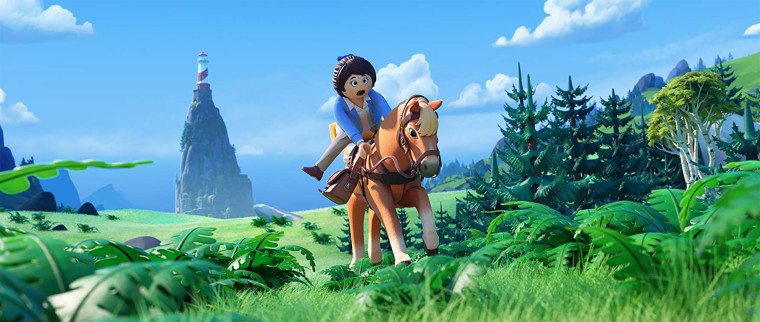The marketing circle of life, wherein toys beget films that beget toys, continues to mow its way through every bit of plastic in the playroom. This week, it’s Playmobil’s turn, with the unimaginatively titled “Playmobil: The Movie.” Like the title, this an uncreative endeavor which attempts to take everything that worked about other toy movies and mash it all together in a Frankenstein’s monster of a film that is also monstrously boring.
This an uncreative endeavor which attempts to take everything that worked about other toy movies and mash it all together in a Frankenstein’s monster of a film.
It was perhaps inevitable that Playmobil toys would eventually have a movie. Production studios have already used up the A-list level toys that kids love, pumping out “The LEGO Movie,” “Trolls,” “Battleship,” “G.I. Joe,” and a slew of animated toys optioned by Disney to appear in the “Toy Story” franchise. With “He-Man” set for a 2021 reboot, and a “My Little Pony” sequel on the way as well — announced at the 2019 New York Toy Fair, natch — it was all but assured someone would think it was time the “klickies” of the German Playmobil sets should get their own time to shine, too.
Invented in the early 1970s, these nearly three-inch tall figurines with molded hair and distinctive hi-lo tunic outfits were a staple of the 1980s, but without the cultural cachet of so many other play sets of the same era. They are Fisher-Price’s Little People, without the memorable finger-pop bottoms; they’re oversized Lego minifigs, without the detachable parts. They are a European’s sensibility of what an American market would want, which also makes them just a little tone deaf. (One of the very first sets featured Native Americans, complete with feather headdresses.) Certainly, they have a collector base — every toy does. But when it comes to nostalgia, trying to claim these toys are something Gen X has an affinity for, or something worth pushing to the next generation of children, is a stretch
These also-ran toys create an also-ran film, which first debuted in Europe in August, at the 2019 Annecy festival in France. The project's most obvious inspiration is, of course, “The Lego Movie,” a 2014 critical darling that can be blamed for most of the toy-based films of the last five years and counting. But “The Lego Movie,” which was created by Oscar-winning duo Phil Lord and Christopher Miller, included both a parody send-up of the typical “hero’s journey” and a clever live-action twist tucked away in its candy-colored center. “Playmobil” manages the live-action part, but without any clever twists.
Anya Taylor-Joy anchors the film as Marla, an 18-year-old who wants to skip college and travel the world. Those big dreams sail out the window after a single musical number with her kid brother, Charlie, when the cops show up and tell them their parents are dead. Four years later, Marla is a hard-working 20-something raising Charlie, now a spoiled tween, in a house they cannot possibly afford the taxes on in Manhattan. Charlie runs away to midtown and a clearly renamed New York Toy Fair. Marla tracks him down via iPhone, and both are magically sucked into a giant Playmobil set. Why? For no other reason other than if they aren’t, there is no adventure.
These awkward live-action bookends feel like something out of an ‘80s movie. Worse, the CGI animation sequences make little sense. When the musical adventure isn’t cribbing from Lego’s journey, it’s borrowing from films like “Ugly Dolls.” (“American Idol” alum Adam Lambert plays antagonist Emperor Maximus, the tyrannical ruler of Constatinopolis, who doesn’t get nearly enough songs to justify his existence.) Unlike “Trolls,” the film’s wannabe earworm numbers are highly unmemorable. Not that any movie should attempt to mimic “Trolls,” which was not only terrible but came with a dangerous anti-medication message. (It also has a naked troll that farts glitter. Don’t be like “Trolls.”)
Worst of all, “Playmobil” wastes what talent it has by refusing to stay with any supporting character long enough for anyone to care about them. Daniel Radcliffe, for example, shows up for about ten minutes in a cameo James Bond knock-off role as Rex Dasher. But the character is so one-dimensional, Radcliffe’s pointed jabs about sexist archetypes are wasted.
It is not the first terrible toy movie spawned by Lego’s success, nor will it be the last. This includes some Lego films themselves.
Infuriatingly, “Playmobil: The Movie” is becoming the status quo rather than an unfortunate outlier. It is not the first terrible toy movie spawned by Lego’s success, nor will it be the last. This includes some Lego films themselves, including the mediocre “Lego Batman Movie” and the awful “Lego Ninjago Movie.” Hasbro, which already put out a horrific live-action “Jem & The Holograms,” has learned nothing from these failures, instead going all out on a five-year deal with Paramount that will result in a slew of toy-based films. Last year’s “Bumblebee” supposedly reboots the “Transformers” franchise, and “G.I. Joe” will be back too, with “Ever Vigilant” next spring.
Meanwhile, Mattel has paired with Warner Brothers on a “Hot Wheels” movie, which I assume will include two kids slapping each other with the track pieces. And in the most meta toy film of the next decade, Funko will make a movie based on… the Funko toys, which are collectibles based on movie and TV characters.
Listen, it was nice that “The Lego Movie” pleasantly surprised critics, and it was even nicer that “The Lego Movie 2: The Second Part” managed to recapture the same magic with a more mature message. But as usual, Hollywood’s bandwagon mentality resulted in an avalanche of boring movies attempting to cash in on a wave of nostalgia only heads of development think exists. The only way to stop the madness is for these movies to start failing at the box office. One can only hope it starts with “Playmobil: The Movie.”


